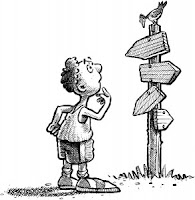Understanding the developmental factors that contribute to biting behavior in children with Aspergers and High-Functioning Autism (HFA) can help moms and dads make environmental or programmatic changes as necessary to minimize the behavior. Guidance to kids who bite should be provided with the goal of helping them develop inner control of their feelings and actions. A quick and consistent response at home can help kids who bite learn to express their feelings in words so that they can become better able to control their behavior.
Why Do Children With Aspergers and HFA Resort To Biting?
1. An attempt to gain sensory input: Many Aspergers children experience sensory difficulties, so it can be helpful to consider the possible sensory functions of particular behaviors. Chewing and biting are proprioceptive activities (i.e., they provide sensory input to the proprioceptive system, which regulates what different parts of the body are doing at different times). Biting can also provide oral stimulation and may provide pleasant or even necessary stimulation to this sensory system.
2. Communication difficulties: For children who may not be able to communicate their wants, needs, and emotional states effectively, biting can be an extremely effective way of letting parents know that something is not right, and is therefore a very useful and powerful form of communication.
3. Developmental stages: The mouthing of objects is a normal part of development. Very young kids put various objects in their mouths to explore the size, shape, and texture of the objects. This normally becomes a problem if the youngster continues to mouth objects frequently past the age of 18 months or so. However, a youngster who missed the initial mouthing phase due to sensitivity in the mouth area or medical issues may have to go through this phase later.
4. Frustration or distress: Sometimes biting can be an expression of sheer frustration or distress in response to a range of different stressors and challenging situations. It is important to remember that life can be exceptionally overwhelming at times for kids with Aspergers and HFA, and that sometimes, the child may engage in a behavior that is a response to this.
5. Learned behavior: Children learn from experiences that they have had, and they use this information to determine how to behave in the future. If they find that behaving in a particular way brings about a good outcome, then they are more likely to behave that way again in the future. Some children might also appreciate the physical or emotional reaction of others in response to biting. The child may enjoy the sound of a raised voice or the sense of control created by behaving in a way which brings a predictable reaction from parents.
6. Toothache or jaw pain: In some cases, biting may be a response to physical pain, in particular tooth or jaw ache.
What Can Parents Do About Biting?
1. Anger management and relaxation training: Some children with Aspergers and HFA may experience difficulties managing emotions (e.g., stress, anxiety, frustration, etc.), which may lead to behavioral outbursts like biting. It is helpful for these children to learn how to identify the physical cues or bodily sensations which indicate that they are becoming agitated, and then to develop alternative, more appropriate activities to assist them to calm down. For example:
• aromatherapy
• asking for help
• counting to ten
• going for a walk
• jumping on a trampoline
• listening to music
• playing on a computer
• swinging
• taking a bath
• taking a few deep breaths
• thinking positive thoughts
• walking away from the scene
• …and any other type of redirection to pleasant, calming activities
2. “Chewables” are cylindrical pieces of rubber tubing (non-toxic, washable and latex-free) that can be sucked or chewed on and provide good resistance for children who need the sensory input provided by biting. Research has shown that “chewables” appear to provide a calming, focusing and organizing function and act as a release for stress. Alternatively, parents may put together a bag of items that provide a range of sensory experiences (e.g., raw pasta, dried fruit, etc.), which the child can be re-directed to.
3. Communication difficulties: Encourage your child to use alternative forms of communication (e.g., visual signs or symbols). Use a range of symbols that he/she can carry around to communicate basic needs (e.g., 'yes', 'no', 'stop', 'go away - I need space', 'I’m in pain', etc.).
4. Environmental modifications: Try to plan for situations that the child finds challenging and make necessary adjustments to the environment. For example:
• increasing structure through the use of timetables or schedules
• maintaining familiar routines where possible
• minimizing unpleasant sensory stimuli
• reducing the number of people
5. Frustration or distress: Frequently remind your child of anger-management and relaxation techniques – especially when he is calm.
6. Functional analysis: Finding the cause of why your child bites is critical in determining the best way of responding to the behavior. For example, if the biting is an expression of frustration, the focus of intervention will be on teaching the child alternative and more appropriate ways of coping with frustration. A good way of determining why a child may be engaging in a particular behavior is to keep a record of behavioral incidents. Some children may be able to communicate their reasons for biting, either verbally or through the use of visual strategies.
7. Improve communication: Assist the child to develop alternative, more appropriate ways of communicating his/her wants, needs, physical discomfort and emotional states. Visual strategies can be very effective, because they can be used in a broad range of situations – and are particularly useful for indicating physical pain or communicating emotional states. Also, social stories can also be helpful in describing why it is not appropriate to bite and by outlining what the child is able to do instead.
8. Increase sensory opportunities: If the child is biting to gain sensory input, then it is important to provide alternative and more appropriate ways of meeting this need.
9. Reinforce appropriate behavior: It is important to pay attention to instances of behavior that you want to encourage to help the child learn that other, more appropriate ways of behaving lead to positive outcomes. Rewards can take the form of:
• preferred activities
• small amounts of favorite foods or drinks
• tokens
• toys
• verbal praise and attention
Clearly name the behavior that you are rewarding, and ensure that rewards are provided immediately after the behavior that you wish to encourage.
10. Respond quickly and consistently to incidents of behavior: Keep responses to biting behavior to a minimum by limiting verbal comments, facial expressions and other displays of emotion (these may inadvertently reinforce the behavior). Speak calmly and clearly and keep facial expressions neutral.
11. Rule out medical and dental causes: Ensure that the child is not biting as a response to physical pain (e.g., toothache or jaw ache). Arrange a check-up with the dentist to rule out any possible physical causes for the behavior.
12. Sensory issues: Re-direct the child to alternative sensory activity such as “chewables” or a “bag of tricks” with edible items. Also, redirect the child to another activity, and praise the first occurrence of appropriate behavior. Maintain physical space and closely supervise the child following an incident of biting.








